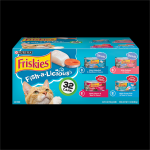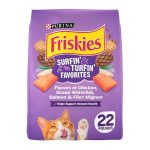Indulge Your Feline Friend: Discover Why My Cat Will Only Eat Fish Flavored Cat Food Now!
Why My Cat Will Only Eat Fish Flavored Cat Food
Dear Cats Lover,
Greetings to all the cat enthusiasts out there! In this article, we will explore the intriguing topic of why some cats have a preference for fish flavored cat food. As cat owners, we often encounter situations where our feline friends display a strong aversion to certain types of food. One common scenario is when a cat will only eat fish flavored cat food, leaving us puzzled and concerned about their nutritional needs. Let’s delve into the reasons behind this behavior and gain a better understanding of our finicky feline companions.
1 Picture Gallery: Indulge Your Feline Friend: Discover Why My Cat Will Only Eat Fish Flavored Cat Food Now!

Introduction
Cats are notorious for being picky eaters, and their preferences can vary greatly from one individual to another. While some cats will devour any type of food, others have specific tastes and cravings. One such preference is the inclination towards fish flavored cat food. This particular choice may seem unusual to us, but it has its roots in the natural instincts and dietary needs of cats.
The following paragraphs will shed light on the what, who, when, where, why, and how of why some cats will only eat fish flavored cat food.
What Makes Fish Flavored Cat Food So Irresistible?

Image Source: thecatsite.com
🐟 Cats are natural-born hunters, and fish is a staple in their diet in the wild. The smell and taste of fish stimulates their predatory instincts, making it highly appealing to them. The strong aroma and unique flavor of fish make it difficult for cats to resist.
🐟 Fish is a rich source of protein and omega-3 fatty acids, which are essential for a cat’s overall health and wellbeing. These nutrients contribute to a shiny coat, healthy skin, strong immune system, and proper growth and development.
🐟 The texture of fish is often soft and easy to chew, making it suitable for cats with dental issues or older cats who may have difficulty eating harder food.
Who Are the Cats That Prefer Fish Flavored Cat Food?
🐟 Cats of all breeds and ages can exhibit a preference for fish flavored cat food. However, some studies suggest that certain breeds, such as Siamese and Maine Coon, are more likely to develop a liking for fish-based diets.
🐟 Cats that have been exposed to fish early in their lives are more prone to develop a preference for fish flavored cat food. Additionally, cats who have had positive experiences with fish, such as receiving treats or praise, may also develop a stronger attraction to this particular flavor.
When Do Cats Start Showing a Preference for Fish Flavored Cat Food?
🐟 The preference for fish flavored cat food can manifest at any age, from kittens to adult cats. It is important to note that kittens are more open to trying different flavors, and their tastes may change as they mature.
🐟 Some cats may develop a preference for fish later in life, possibly due to changes in their taste buds or a desire for variety in their diet.
Where Can I Find Fish Flavored Cat Food?
🐟 Fish flavored cat food is readily available in most pet stores and supermarkets. It comes in various forms, including dry kibble and wet canned food. When selecting fish flavored cat food, it is crucial to choose high-quality brands that provide a balanced and nutritious diet for your feline companion.
🐟 It is advisable to consult with your veterinarian to ensure that the fish flavored cat food you choose meets your cat’s specific dietary requirements and suits their individual health needs.
Why Does My Cat Only Eat Fish Flavored Cat Food?
🐟 Cats have a highly developed sense of smell, and the aroma of fish is particularly enticing to them. The scent triggers their natural instincts and stimulates their appetite.
🐟 Some cats may have developed a strong association between fish flavor and positive experiences, such as receiving treats or rewards. This positive reinforcement can reinforce their preference for fish flavored cat food.
How Can I Encourage My Cat to Eat Other Flavors?
🐟 Gradual Transition: If you wish to introduce other flavors to your cat’s diet, a gradual transition is recommended. Mix small amounts of the new food with their favorite fish flavored cat food, slowly increasing the proportion over time. This method allows your cat to adjust to the new taste and reduces the likelihood of rejection.
🐟 Variety is Key: Offer a diverse range of flavors and textures to entice your cat’s curiosity. Rotating between different protein sources and flavors can prevent your cat from becoming overly fixated on one taste.
🐟 Seek Professional Advice: If your cat’s refusal to eat other flavors becomes a concern, consult with your veterinarian. They can provide guidance tailored to your cat’s specific needs and offer solutions to ensure a balanced diet.
Advantages and Disadvantages of a Fish Flavored Cat Food Diet
🐟 Advantages:
1. High in Protein: Fish flavored cat food is a great source of protein, promoting muscle development and overall health.
2. Essential Nutrients: Fish is rich in omega-3 fatty acids, which aid in the prevention of inflammation and promote a healthy coat and skin.
3. Suitable for Picky Eaters: Cats who are reluctant to try other flavors may find fish flavored cat food more appealing, ensuring they receive proper nutrition.
🐟 Disadvantages:
1. Allergies: Some cats may develop allergies or sensitivities to fish, leading to digestive issues or skin problems. It is important to monitor your cat for any adverse reactions.
2. Mercury Concerns: Fish can contain trace amounts of mercury, which can accumulate in a cat’s system over time. Regularly rotating proteins can help mitigate this risk.
3. Nutritional Imbalance: Relying solely on fish flavored cat food can lead to an imbalance in essential nutrients. It is important to supplement your cat’s diet with other protein sources and consult with a veterinarian for dietary guidance.
Frequently Asked Questions (FAQs)
1. Can I feed my cat fish from my own kitchen?
🐟 While small amounts of cooked fish can be incorporated into your cat’s diet, it is essential to remove all bones, seasonings, and oils. Consult with your veterinarian to ensure it is safe for your cat and does not disrupt their balanced diet.
2. Is it harmful if my cat only eats fish flavored cat food?
🐟 A diet solely based on fish flavored cat food may lack essential nutrients found in other protein sources. It is advisable to incorporate variety into your cat’s diet to ensure they receive a well-rounded nutritional profile.
3. Can I switch my cat’s food abruptly?
🐟 Abrupt food changes can cause gastrointestinal upset in cats. To avoid digestive issues, gradually transition to new flavors by mixing them with the current food.
4. Should I be concerned if my cat refuses to eat other flavors?
🐟 While it is advisable to offer a variety of flavors to your cat, some cats may have a strong preference for fish. As long as their dietary needs are met, it is not a cause for concern. However, consult with your veterinarian if you have any doubts about your cat’s nutrition.
5. Can I add supplements to my cat’s fish flavored cat food?
🐟 Before adding any supplements to your cat’s diet, consult with your veterinarian. They can assess your cat’s specific needs and recommend appropriate supplements, if necessary.
Conclusion
In conclusion, the preference of cats for fish flavored cat food can be attributed to their natural instincts, dietary needs, and individual experiences. While it is important to ensure a well-balanced diet for our feline friends, understanding their preferences and providing a variety of flavors can enhance their mealtime experience. Remember to consult with your veterinarian for guidance on meeting your cat’s specific nutritional requirements. Happy feeding!
Final Remarks
Disclaimer: The contents of this article are for informational purposes only and do not replace professional advice. Each cat has unique dietary needs, and it is essential to consult with a veterinarian regarding their specific requirements. The use of any information in this article is solely at the reader’s discretion.
This post topic: Cats



